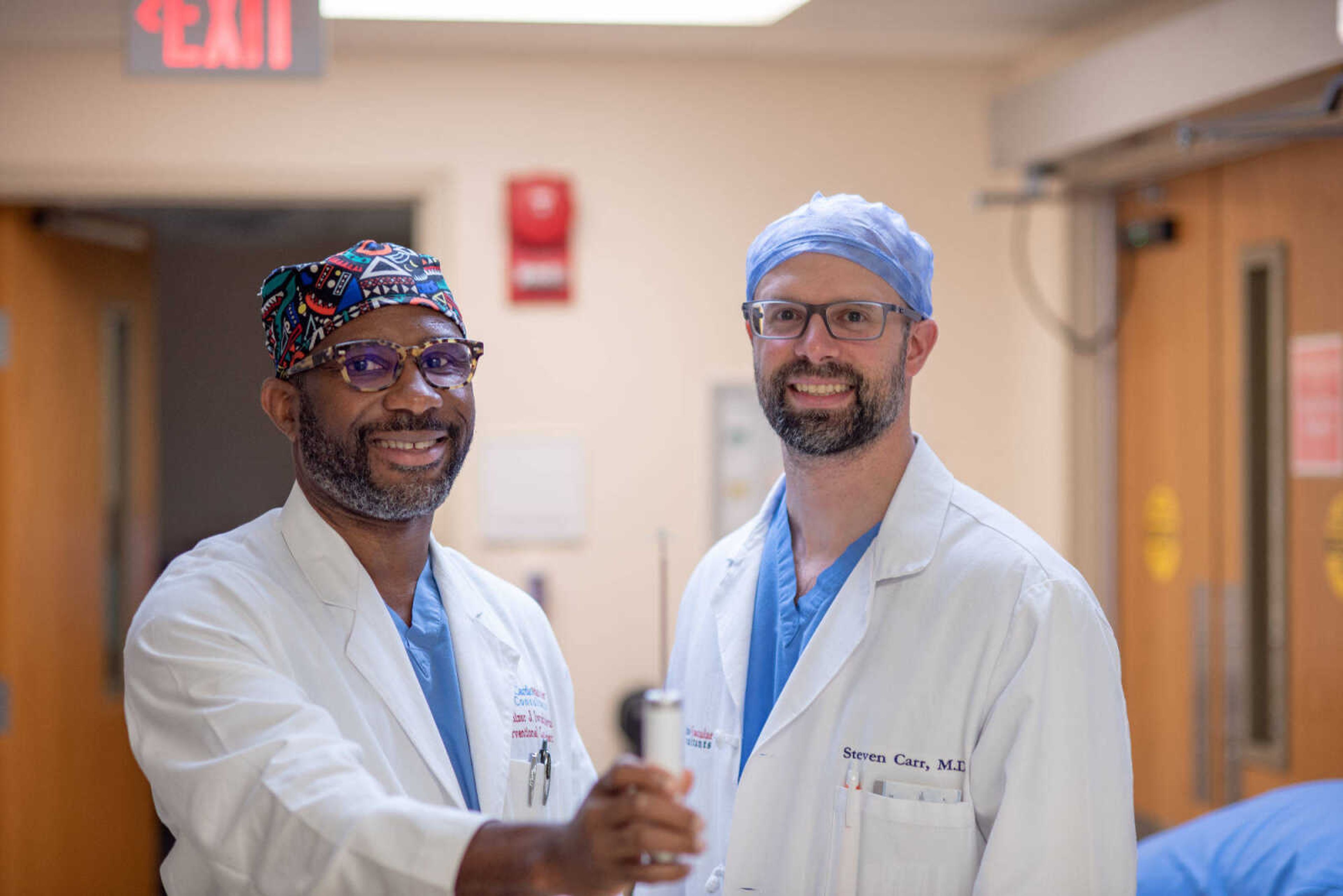It's Called TMVR: SoutheastHEALTH Offers Innovative Non-Surgical Treatment for Leaky Mitral Valves
An estimated 50,000 people in the United States undergo open-heart surgery each year for the treatment of a leaking mitral valve. However, this major surgery is not an option when patients are too old or have other medical complications. At SoutheastHEALTH, cardiologists and cardiothoracic surgeons now are collaborating on a minimally invasive procedure that can repair the mitral valve in these previously untreatable patients...
An estimated 50,000 people in the United States undergo open-heart surgery each year for the treatment of a leaking mitral valve. However, this major surgery is not an option when patients are too old or have other medical complications.
At SoutheastHEALTH, cardiologists and cardiothoracic surgeons now are collaborating on a minimally invasive procedure that can repair the mitral valve in these previously untreatable patients.
"This truly is the next generation of minimally invasive cardiac procedures, and it's now available at SoutheastHEALTH in Cape Girardeau," says Paul Robison, MD, MMM, CPE, FACS, FACC, FACCP, a cardiothoracic and vascular surgeon with Cardiovascular Consultants in Cape Girardeau, Missouri.
The heart has four valves -- aortic, mitral, tricuspid and pulmonary -- that automatically open and close to keep blood flowing into and out of the chambers of your heart. These valves allow blood to flow only in one direction. Sometimes, though, they don't work properly. If the flaps of the valve don't close tightly, it can cause blood to flow backward in your heart. If the valve becomes stiff and opens only partially, it can limit blood flow through the heart and to the rest of the body.
When the blood flows backward in the heart due to a leaky valve, it is called regurgitation. One of the most common places where it is diagnosed is in the mitral valve, which is located in between the upper left and lower left chambers of the heart. A quarter of a million people in this country are diagnosed with mitral valve regurgitation each year.
The condition, like most heart valve problems, often doesn't have any early symptoms. As it progresses -- and it can occur suddenly or over many years -- it can cause the heart to work harder to circulate blood. Common signs of valve problems include:
* Shortness of breath, either while lying down or during activities
* Heart murmur or unusual heartbeat
* Heart palpitations
* Swelling in legs, ankles or stomach
* Unusual fatigue
* Dizziness
While some people are born with defective heart valves, there are other factors that can increase your risk for developing these problems. High blood pressure, high cholesterol, diabetes, obesity, smoking and a family history of heart disease all are risk factors.
Treatments for Mitral Regurgitation
Previously, heart doctors treated mitral regurgitation with medications that eased symptoms but didn't fix the problem of a malformed or broken valve. Open-heart surgery was the next option, which required a surgeon to open the chest, stop the heart temporarily and then replace the valve with either a manmade or biological tissue valve.
Repairing versus replacing the mitral valve began in the 1970s. The procedure, though, still required open-heart surgery and the use of a heart bypass machine while the valve was repaired. Patients who were frail, older or who had multiple medical issues were not candidates for the open-heart valve repair procedure.
"About a third of our open heart surgery volume at SoutheastHEALTH still is valve-related," says Dr. Robison. "The great news is that because we now have the ability to offer minimally invasive mitral valve repair, we have options to offer patients who are not eligible for open-heart surgery."
Called transcatheter mitral valve repair (TMVR), the minimally invasive procedure involves the insertion of a catheter through a vein in the groin. The catheter is then carefully guided up to the heart, where an interventional cardiologist and a cardiothoracic surgeon can then work together to repair the valve.
"It's incredibly important for SoutheastHEALTH to have this technology to continue to advance treatment options for our region's critically ill heart patients. This advanced treatment option represents the latest commitment in achieving that goal," adds interventional cardiologist David Law, MD.

The MitraClip
Repairs now can be made with an innovative device called a MitraClip. First approved by the FDA in 2013 for patients with severe and degenerative mitral regurgitation who also had heart failure symptoms resulting from an abnormality of the mitral valve. Earlier this year, the device was approved for an expanded use in patients with heart failure symptoms with moderate to severe mitral regurgitation due to diminished left heart function.
"The MitraClip basically clips together the two faulty flaps that close the mitral valve so that blood doesn't leak backward," explains Dr. Law.
Because it is a minimally invasive procedure, patients can typically leave the hospital two to three days after the procedure. Significantly, clinical trials evaluating the device's effectiveness found that the risk of being re-hospitalized for heart failure symptoms was reduced in about 47 percent of the patients who had the MitraClip procedure versus patients who did not receive the device. In addition, the risk of death within two years was decreased by more than one-third in the MitraClip group compared to the control group.
"We now know fixing the valve matters. The MitraClip improves survival," says Ohio State University Cardiovascular Director William Abraham, MD, one of the principal investigators in the latest MitraClip clinical trial. "It is the first time we have ever seen in any randomized, controlled trial an outright reduction in heart failure hospitalizations, all-cause mortality and improvements in the quality of life and exercise to a tremendous magnitude."
Dr. Robison agrees. "We think this is a valuable new treatment option for our patients," he says. "This, along with minimally invasive transcatheter aortic valve replacement (TAVR), which we also do, represents our dedication to bringing highly advanced procedures to SoutheastHEALTH to improve outcomes and quality of life for our patients."
A team of heart specialists is collaborating on the MitraClip procedure and in evaluating and treating patients with valve disease. They include:
~Cardiologists
~Cardiothoracic Surgeons
Steven Carr, MD
Paul Robison, MD
Chizor Iwuchuku, MD
George Berbarian, MD
Gabe Soto, MD
~Anesthesiology
Jeffrey Keck, MD
A multidisciplinary Valve Clinic also is offered monthly at Cardiovascular Consultants in Cape Girardeau to make it convenient for patients to see both cardiologists and cardiothoracic surgeons during the same visit.
"We have innovative treatment options, a new inpatient cardiac unit, a new state-of-the-art operating room equipped specifically to handle these minimally invasive and advanced procedures, and a growing collaborative effort with the Division of Cardiothoracic Surgery at Washington University," says Dr. Robison. "All of these showcase the depth and breadth of the heart program at SoutheastHEALTH."
Connect with the Southeast Missourian Newsroom:
For corrections to this story or other insights for the editor, click here. To submit a letter to the editor, click here. To learn about the Southeast Missourian’s AI Policy, click here.







